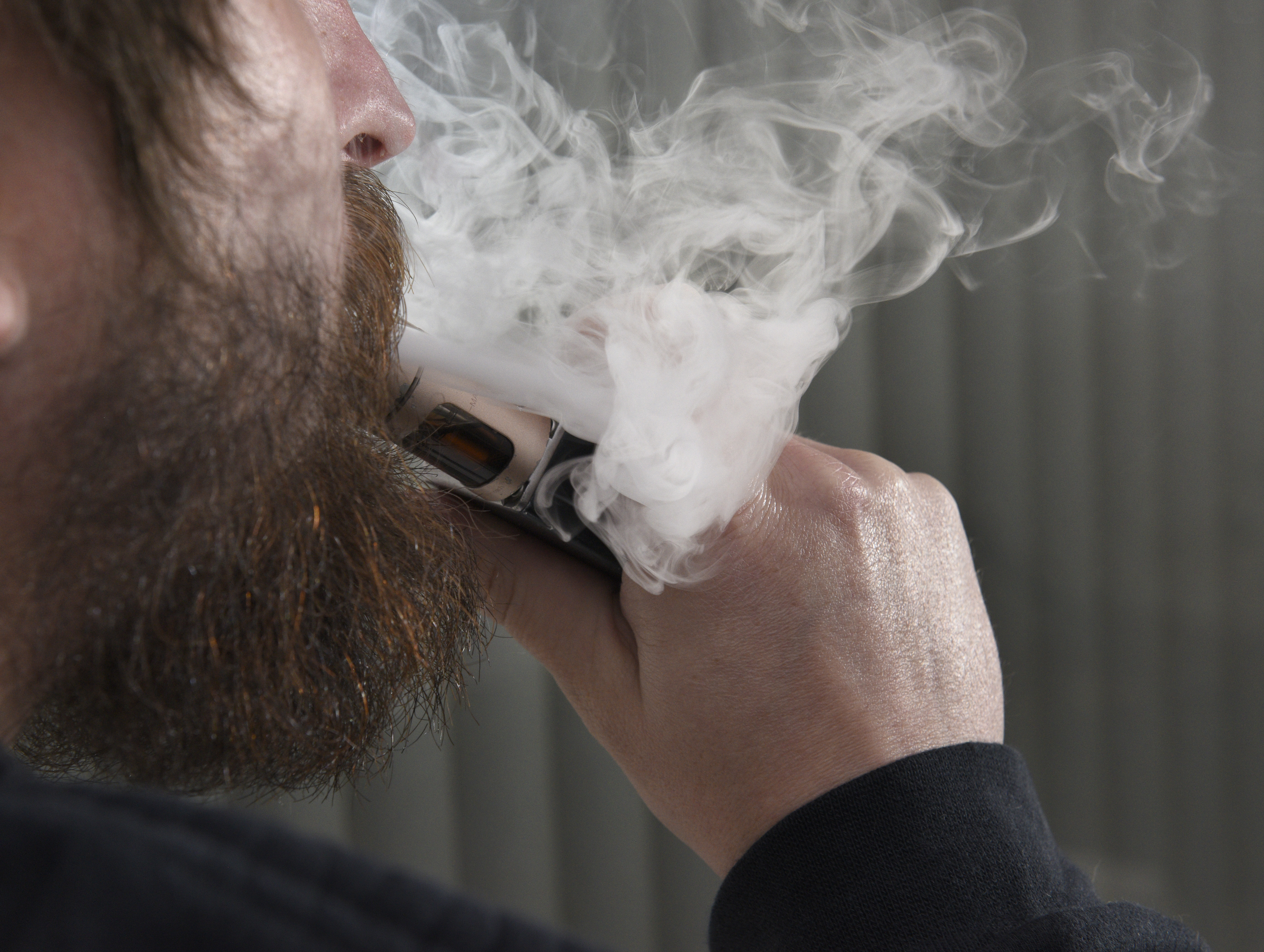Responding to Youth Vaping Epidemic, County Bans Flavored Nicotine Products
Ban Also Covers Menthol Products, Small Packs, and Mail-Order Delivery

It was late last Tuesday morning, and Vanessa Ramirez should have been on her way to her next class, she said. Instead, the Dos Pueblos High School junior felt compelled to “advocate for all my friends.”
Ramirez was addressing the Santa Barbara County Board of Supervisors as they considered a sweeping ban on all flavored nicotine products, including the e-juice used in vaping devices, which the U.S. surgeon general has blamed for a new epidemic of nicotine addiction among youth.
Locally, between 2016 and 2018, e-cigarettes usage nearly doubled, from 6 percent to 10 percent, by 9th graders, and 8 percent to 15 percent by 11th graders. Each juice pod sold by Juul, the brand with a majority share of the market, contains as much nicotine as two packs of cigarettes; young users typically ingest one to four pods a day that are made to taste like pop tarts, ice cream, apple juice, or other treats. Devices are manufactured in the shapes of pens, wallets, and watches to hide in plain sight. Santa Barbara teachers describe school hallways and bathrooms permeated by the sickly-sugary aroma of vapor.
“We have been targeted,” Ramirez said. “My generation is falling into a very deep hole of addiction.” Speaking through tears, she described how some of her classmates recently skipped a multi-day field trip because they couldn’t go more than a few hours without vaping. And she wondered why the predatory marketing of Juul and others hasn’t been challenged. “It is really disheartening to see that nothing has been done,” Ramirez said, referencing the regulatory inaction at both the state and federal level. “People are still ignoring the issue.”
Santa Barbara’s supervisors, however, didn’t ignore Ramirez or the many other public speakers they heard from that day, including doctors, parents, and other young students. They voted last week, and affirmed this Tuesday, to ban flavored nicotine products throughout the unincorporated areas of the county. The ban also covers menthol products, the mail-order delivery of nicotine items, and the sale of small and inexpensive pack sizes, like the two for $1 packs of Swisher Sweets cigarillos. The new law follows similar rules passed by jurisdictions throughout the state, including in Ventura and San Luis Obispo counties.
“Can you picture the adults in a corporate boardroom who thought it was a good idea to addict children to nicotine?” asked Supervisor Gregg Hart. “It’s unfathomable, and the fact that the state and the feds haven’t taken action is beyond ridiculous.”
Supervisor Joan Hartmann agreed with Hart. “This kind of trickery to lure children into addiction so that others can profit — it’s really unconscionable,” she said.
While other legislators may be sitting on their hands, Santa Barbara doctors reminded the board that California’s Department of Public Health made the stunning announcement in November that people should immediately cease vaping until more research is done on its health impacts.
Unregulated by the FDA and containing mysterious cocktails of volatile compounds, heavy metals, and artificial flavoring, vaping has been blamed for 173 hospitalizations and four deaths in the state, in addition to more than 2,000 reports of lung damage across the country. Health experts say the rampant usage has undone much of the progress made to curb teen nicotine consumption over the last two decades. Developing minds, they explain, are poisoned by the drug that affects attention, learning, and memory.
The ban was not without its critics. Isis Dominguez, a spokesperson for county tobacco retailers, agreed usage among minors is a bad thing, but she described Santa Barbara’s measure as “knee-jerk and overreaching.” She said vaping devices help smokers transition away from cigarettes, and she blamed the media for dispersing misinformation about health concerns. “The proposed measure will hurt more people than it will help in aggregate,” she claimed.
Ben Pierce, the owner of Santa Barbara area vape store, said responsible businesses such as his shouldn’t be punished because others are illegally selling nicotine products to buyers under 21.
“I’ve done my part to ensure my products are age-restricted,” he said. “I don’t want to be the monster I’m being represented as.” Rather than enacting blanket legislation, the county should identify and crack down on the scofflaws, he said. “My question is, Where are the kids getting it? because they’re not getting it from me.”
County health officials responded that most minors illegally purchase their products from a physical location. Others buy online, through social media platforms like Snapchat, or from older siblings.
Supervisor Peter Adam was the only one of the five supervisors to vote against the ban. He took issue that the prohibition included menthol cigarettes and small-pack cigarillos.
“When you get into the stuff that’s been traditionally available to people over 21, I got a problem with that,” he said. Adam also postulated that in order to skirt the law, Santa Barbara residents would simply drive to Las Vegas, load up on vaping supplies, and sell them here. “There will be the exact same amount on the street,” he said. “So good luck with that.”
County health staff said studies show that local bans greatly reduce local consumption.



